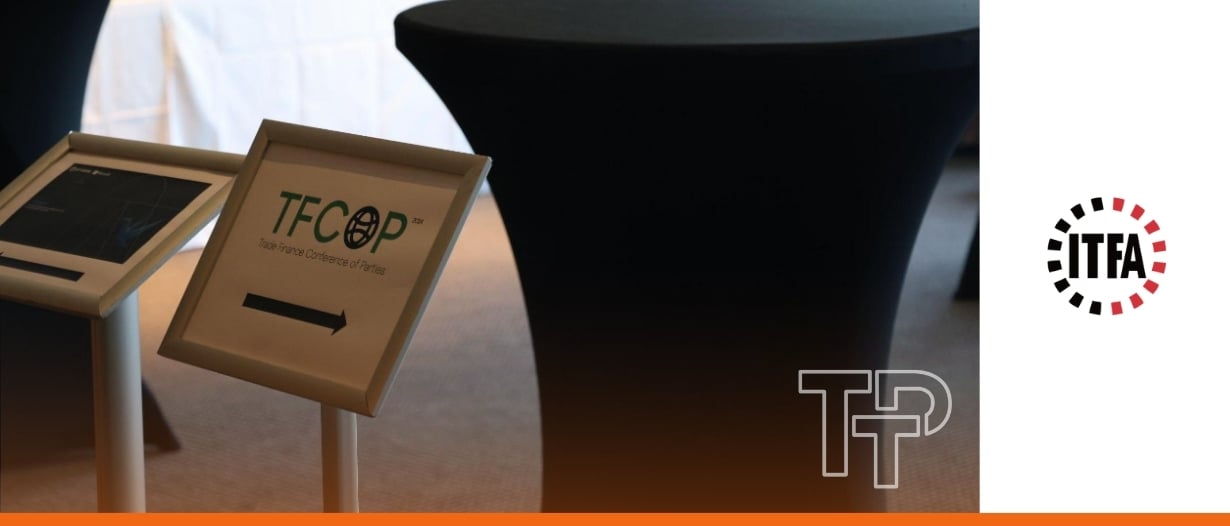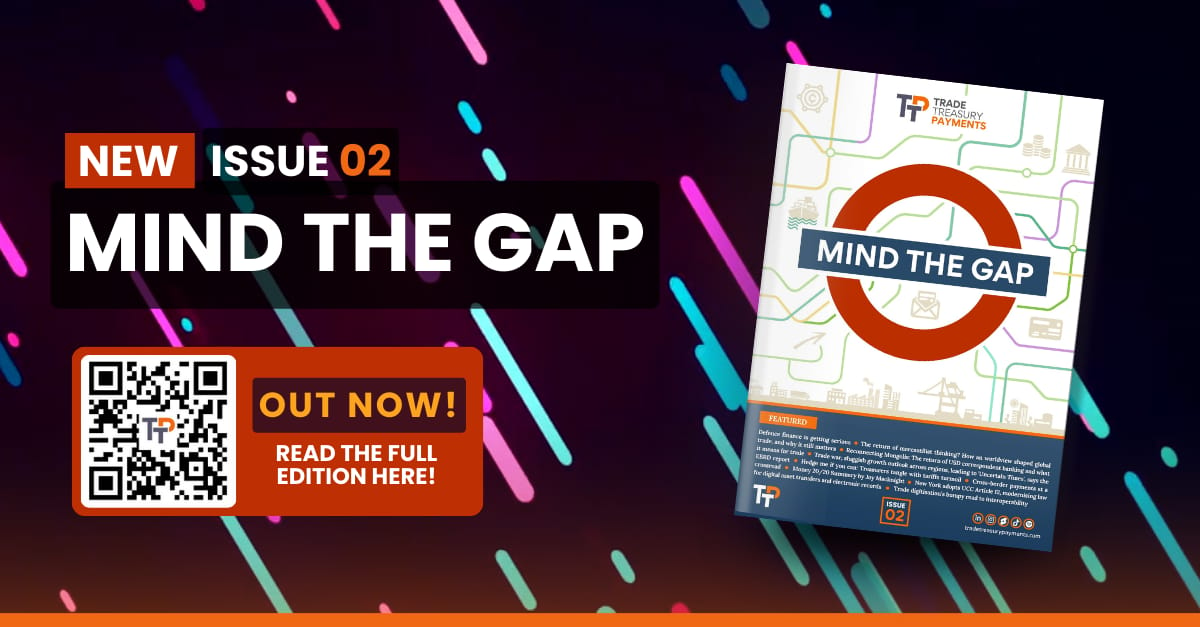- Trade Treasury Payments | The Liquidity Brief
- Posts
- Welcome to the TTP Liquidity Brief | Issue 15
Welcome to the TTP Liquidity Brief | Issue 15
Curb your Monday blues with our liquidity brief. The only newsletter in liquidity and risk management that you need to subscribe to. For the hustler, the CEO, the intern, the MD. Prepare for your week ahead, with the biggest voices, heavyweight leaders, and the meaningful conversations in trade, treasury, and payments. No spin, no bias, no gatekeeping—just honest, high-value insights.

🌟 Editor's note
Editor’s Note | Week of 28 July 2025
This past week, the world’s attention turned to the smallest global trade actors, finally giving them the stage they deserve.
At the inaugural Global SME Ministerial in Johannesburg, ministers from over 60 countries came together to talk finance, digital, and green transitions. From the $5.7 trillion financing gap to the fragmented digital rules that keep small firms out of global value chains, the conversation cut through the platitudes and tackled real constraints with real policy commitments. TTP’s Carter Hoffman attended, and we’ve included a special supplement featuring insights fresh out of the SME Ministerial.
Elsewhere in this edition, we go deep into UKEF’s latest numbers, two digital trade pilots, a Lloyd’s syndicate debut, and some long-overdue clarity from Singapore’s courts on LC fraud. We also spotlight some momentum in the world of payments, from ISO 20022 implementation to new tokenised MMF models.
Also in this newsletter:
💥 A Singapore court delivers long-awaited clarity on Letters of Credit and fraud risk in a case that the oil trade world is watching closely.
📉 What UKEF’s £14.5bn really tells us about the UK’s trade strategy, and the subtle pivot from SMEs to something bigger.
📄 Digital trade goes mainstream: J.P. Morgan executes a live eBoE transaction with MTN South Africa; Lloyds and Maersk digitise a tea shipment from Kenya.
⚖️ The WTO’s World Tariff Profiles 2025 reveals that 74% of global trade still relies on MFN rules.
💰 From RMB’s position in global payments to Goldman and BNY’s tokenised MMF platform.
🎙️ In this week’s podcast: Owning Your Treasury Story, Mike Richards discusses caffeine, spreadsheets, and why treasurers need a better narrative.
📊 Plus: New SCF products from HSBC and Standard Chartered, FX volatility driven by tariffs, and the Denmark payments outage that left a continent holding its card.
Onwards,
— The Editors
Skip to your favourite part
Slow read

In an age when digital payment systems have become as essential to modern life as electricity or running water, Denmark’s Saturday evening plunge into financial darkness showcases technological vulnerability. For approximately 2.5 hours on what should have been an ordinary weekend, Nets, one of the Nordic region’s preeminent payment processors, experienced a system-wide failure. As card transactions failed across Denmark and neighbouring Nordic countries, a cascade of disruption rippled through payment terminals, toll stations, and public events.
Online chaos no longer virtual
The payment system failure occurred between 8:00 p.m. to 10:30 p.m local time on Saturday, 19th July. During this critical period, credit and debit card transactions were systematically rejected throughout Denmark, Norway, and Finland. The widespread nature of the outage highlighted the region’s substantial dependence on digital payment infrastructure, with over 90% of point-of-sale transactions in Denmark typically conducted via card payments.
Evidence from various sources indicates that the disruption extended beyond Nordic borders, as Danish travellers in France, Germany, and Italy also encountered difficulties using their bank cards. This international dimension suggests the fault impacted services connected to Nordic banking systems across multiple countries, creating a financial disruption that transcended national boundaries.
The most significant consequences of the system failure manifested at the Storebælt Bridge, a critical transportation link connecting eastern and western Denmark. Electronic payment systems failure during peak weekend traffic flows transformed into a miles-long parking lot of frustration and mounting tension. Only drivers using the AutoPay license plate recognition system or those carrying cash could proceed through the toll booths without delay. For thousands of others, the seemingly routine crossing became an hours-long ordeal as vehicles accumulated in queues stretching kilometres in both directions.
The situation soon deteriorated from inconvenience to crisis. Law enforcement reports detail how certain motorists, their patience exhausted after hours of immobility, attempted to circumvent toll barriers, resulting in substantial infrastructure damage. Most disturbingly, toll station personnel faced verbal abuse.
The timing of the outage coincided with peak weekend activity, affecting numerous public gatherings. In Aarhus, the travelling concert festival Grøn experienced significant operational challenges as payment terminals failed. Vendors at the festival, which typically attracts thousands of attendees, were unable to process payments for food, beverages, and merchandise during the event’s busiest hours.
Although payment systems eventually resumed functionality later Saturday evening, event organisers expressed concern regarding lost revenue and the logistical complications caused by the unexpected technological failure.
With more than 5.2 million Danish citizens relying almost exclusively on card-based payment systems for daily transactions, the disruption affected virtually the entire population. From supermarkets to service stations, restaurants to retail establishments, ordinary commerce temporarily reverted to an earlier era, revealing how completely digital payments had woven themselves into the fabric of Danish society, and how fundamentally disruptive their absence could become.
While the reason for the outage is yet to be made public. An investigation is underway and Nets have mummed on any public comments. However, according to Bjarne Nigaard, the head of secretariat at the Danish Emergency Services, the outage could have occurred due to either a technical error or a human error. He further explained that in November last year, TDC faced a similar situation when an error in an update caused its mobile network to shut down. “But in these times, one cannot help but also think about whether it could be someone from outside who intends to create insecurity and uncertainty. But we don’t know that yet,” he quoted to TV2, which is a Danish government-owned broadcast station.
Photos of the week

TTP Trade Editor Carter Hoffman caught up with Matthew Wilson, Ambassador and Permanent Representative - Designate of Barbados to the United Nations, World Trade Organization, and other International organizations in Geneva, and Chair of the WTO MSME Working Group. In this podcast we discussed first impressions of the International Trade Centre Ministerial, the work of the WTO MSME Working Group, and the priorities for small island developing nations like Barbados.
Highlights from the ITC SME Ministerial
Trade digest
Treasury & Payments digest
🗓️ Upcoming events
Featured events by TTP
Partner events
ADB Annual Awards and Dinner
| ITFA Annual Conference
|
BAFT Virtual Trade Finance Workshop
| SME Finance Forum
|
Sibos
| TTP Boat Cruise at Sibos
|
Multimedia from Trade Treasury Payments
Podcasts
Videos
At the FCI and IFC conference in Tashkent, Trade Treasury Payments (TTP) spoke with Aziz Kakhkharov, Assistant in Sales & Marketing at Efcom GMBH, to discuss the structural foundations necessary to unlock factoring in Uzbekistan.
At the ITFA Americas Annual Conference in Miami, Trade Treasury Payments (TTP) sat down with Michael Mandell, Managing Director for the Americas at Komgo, to discuss the evolution of digital tools in trade finance and how institutions are progressing from manual processes to integrated platforms.
Reels
📽️ Reels | ITFA Education Day: Chris Hall talks about Credit Risk Insurance
💡 At the recently held ITFA Week, TTP caught up with ITFA board member Chris Hall during the ITFA Education Day.
Hall gave us a quick overview about credit risk insurance and how it works.
TTP is a proud media partner of this event.
🏆 GAP of the Week: John Omoti, Bank of China (UK)

🌟 Daily Mission:
To help people succeed and become their best selves, whether at work or in everyday life.
To approach each day with gratitude, discipline, and a genuine smile, no matter how busy it gets.
To grow in wisdom and influence while making at least one person feel valued daily.
🤳 Behind the scenes:
I’m that person who watches football highlights late at night even after a long day.
My quiet moments are often spent praying, reading my bible, reflecting on how to be a better man that empower others.
I love listening to gospel music, messages and inspirational talks– it inspires for the day
🪷 Life Mantras:
“Excellence with humility always wins.”
“If it helps someone rise, then it’s worth doing.”
"I believe what you make happen for others, God will make happen for you."
“God first, family next, everything else will align.”
📋 Hidden facts:
I can play ping pong for hours without feeling tired.
I love watching movies and series on Netflix.
I lead an African professional network called LikeMinds for career development and idea incubation.
I mentor several young people not just for career advice, but to develop authentic leadership.
I chair my University Alumni Association globally.
🏆 Don’t miss it: Our latest magazine
In Issue 02: Mind the Gap, we’ve zeroed in on gaps. There are gaps in liquidity access, policy frameworks, correspondent banking, payments infrastructure, tariff coverage, and geopolitics. There’s also a GAP at TTP - and in this edition, you can start to learn all about our fantastic Global Advisory Panel.
We created TTP to cut through the dense and the dull. To do that, we strive to highlight the hidden flows, vulnerabilities, and intersections that make global trade and finance happen. We hope this magazine reflects that ambition.
As you read through, you can expect layered reads, tight design, and content tailored to its purpose. Be warned: this is not your typical PDF flip-through.
We hope you get as much out of this edition as we got putting it together.
Happy reading!
Did You Know? Over 90% of all point-of-sale transactions in Denmark are conducted by card, so when the Nordic region’s major payment processor Nets went down for just 2.5 hours, it brought toll roads, concerts, and entire cities to a standstill. As digital payments replace cash, the cost of even short-term outages is systemic.
Till next time,






















